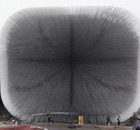Editorials
Kudos to revision of law
(China Daily)
Updated: 2010-03-09 07:50
 |
Large Medium Small |
It is very hard to justify and swallow the de facto inequality between urban and rural residents in the election of deputies to the People's Congresses.
Despite all the rhetoric about the wisdom of the quota allocation in the 1979 Law on Election of Deputies to National and Local People's Congresses, we have never heard any convincing explanation of why each rural deputy to the National People's Congress (NPC) must correspond to a population base four, five, or even eight times greater than what his or her urban counterpart represents.
Although a rural deputy to the National People's Congress theoretically represents a population seven times greater than the representation of an urban counterpart, their votes carry equal weight in the vote count at the national legislature.
| ||||
But voter suffrage does not bring physical changes to the rural landscape. In the sense of the full and complete political integration of our urban and rural societies, however, it outweighs all previous endeavors to narrow the urban-rural divide.
Bestowing upon rural residents an equal footing in elections represents a substantial boost to their voting rights. It corrects a historical disadvantage, if not a wrong. The fact that the law went through four rounds of revision before but failed no longer matters.
The revision of the Election Law is something to celebrate. We only hope positive changes like this happen sooner and more frequently.
(China Daily 03/09/2010 page9)













